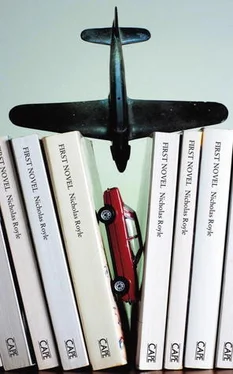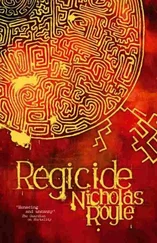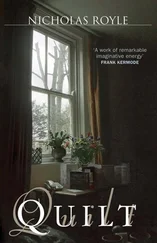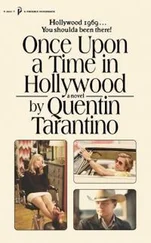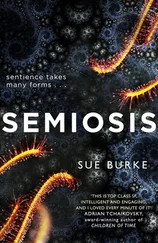‘Is he thin?’ Nicholas asked.
‘He seems thinner to me,’ she said.
‘So you think he’s using rather than supplying?’
‘He could be doing both. But he’s definitely lost weight.’
‘You see him less often than I do,’ Nicholas pointed out. ‘You’re more likely to notice change.’
In his final year, Nicholas threw himself into German. A warning from the dean that he would almost certainly fail if he didn’t buckle down seemed to be the catalyst. As for the language, a few days in West Berlin, taken at the last convenient moment before the exams, over Easter, when it happened to be snowing in that part of Germany, helped more than he would have imagined possible. Just being surrounded by the language, both spoken and written, made an appreciable difference to his understanding and ability to express himself. In the end, he got a decent result, an upper second, and like most of his fellow non-vocational students went straight on to the dole. He tried to get more work experience, but that wasn’t happening either. He kept his hand in by contributing to fanzines. He and Liz, who was still studying, found a flatshare in Archway with two other medics. He saw his father on a fairly regular basis and came to agree with Liz that he was looking gaunt. Ray seemed as cheerful and positive as ever, offering words of advice at the same time as warning Nicholas he was the last person in the world who should be handing it out, particularly on the subject of careers. However, he was able to fix his son up with a week at his publishers — unpaid. Nicholas enjoyed it, but not as much as he had Time Out . He retained vivid pictures in his head of the ramshackle office, with its countless in-trays and bulldog clips, wire pigeonholes, sheafs of paper sliding off desks, dodgy swivel chairs. He loved the teetering towers of CDs, videos and books, the overflowing baskets full of old Jiffy bags ready for reuse.
The publishers’ office, by contrast, was much quieter and more sedate. He didn’t see any authors until his last day when a small flurry of activity greeted the arrival — and departure soon afterwards — of a first-time novelist.
Nicholas came off the dole to work a short-term contract at the National Union of Students as Information Officer. On the staff there he met another writer, Judith Meadows, whose first novel, The Summerhouse , had just been published. He proudly told Judith who his father was and she gave him an enigmatic smile. Over the next few weeks he realised all her smiles were enigmatic. He found a copy of The Summerhouse years later in a second-hand bookshop. On the back was a large photo of the author wearing an enigmatic smile.
The NUS contract terminated, Nicholas was sitting in the flat in the middle of the day writing another round of job applications when the phone rang.
He left the applications unfinished on the kitchen table and took the Tube from Archway to Goodge Street, then walked the short distance to Middlesex Hospital. He found Broderip Ward without difficulty. It was not how he imagined a hospital ward to be, especially an NHS hospital ward. It looked more like a hotel. A posh one at that. The beds had duvets instead of sheets and blankets. There were telephones by the bed and potted plants dotted around and comfortable seating areas with magazines and coffee machines. He found his father sitting up in bed writing in a notebook, which he immediately closed and put to one side when he saw Nicholas.
‘Hello, son.’
‘Dad.’
‘Sit down, sit down.’
‘Dad, what are you doing here? What’s wrong?’
Nicholas had learnt nothing in the initial phone call, only that his father was in hospital. He’d made the Tube journey in a state of suspended emotion, but with anxiety building up inside him. The sight of his father — thinner-looking, haggard even — was a shock. He had never before seen his father in pyjamas. There was a rust-coloured sore on his neck.
‘Dad?’
‘Nicholas. There’s some stuff I haven’t told you.’
‘You’re dying!’
‘No, I’m not dying. I’m not very well, but I’m going to get better. Do you know where you are?’
‘In a hospital. What are you talking about?’ Nicholas felt himself getting angry. His father appeared to be playing games.
‘This ward,’ said Ray gently. ‘You might have seen it on the news or read about it. It was only recently opened, by Princess Diana. There’s been a bit of fuss in some quarters. It’s too nice, there’s too much money being thrown at it.’
There was a silence, which Nicholas broke.
‘It’s the AIDS ward.’
‘Yes, it’s the AIDS ward. But don’t worry, you are not at risk.’
‘I’m not worried about being at risk,’ Nicholas snapped. ‘You’ve been sick for a long time.’
‘Yes.’
‘Why didn’t you tell me? All those times you didn’t show up, you were in here getting treatment.’
‘I was getting tested. Prodded and probed. And treated for infections, yes.’
‘Why didn’t you tell me?’
‘I couldn’t tell you.’
‘Why couldn’t you tell me?’
‘Because it would have meant telling you other stuff, too, that maybe you wouldn’t have wanted to know.’
‘You mean about you being gay?’
Now Ray was silent.
‘Yes,’ he said eventually. ‘You knew? How did you know?’
‘I don’t know. I just knew. You’re my dad.’
‘I wish I’d known,’ he said.
‘That I knew?’
‘Yes.’
‘Well, I wish you’d felt you could talk to me about it,’ said Nicholas.
‘I didn’t know what you would think. And I kind of thought it would be disloyal to your grandparents, in a funny way. Better to maintain the illusion.’
‘Better to tell a lie?’
‘A white lie.’
‘Is that how you got sick?’
‘Probably. Yes. Definitely. I mean, almost certainly.’ Ray sighed. ‘For a long time they didn’t have a clue what was going on. With me and with lots of others. They’ve got more of an idea now.’
Ray explained about HTLV3 and HIV and AIDS.
‘They’re calling it a Gay Plague,’ he said.
He explained about the haemophiliacs, about the worries over blood.
Nicholas said he’d seen the tombstone adverts and he’d read James Anderton’s double-page rant in the Daily Mail , which had done the rounds at the NUS when he’d been there.
He took hold of his father’s hand, which he was pleased to feel grip his tightly.
‘Do you have AIDS?’ he asked.
‘No, I have HIV.’
‘So why do you have to be in here? Will you get to leave?’
‘I had a bad turn. My T-cell count went down, but it’s already back up. I’ll be out of here in no time. I may have to come back in, but then I’ll get out again. That’s how it’s going to be.’
There was another silence.
‘I wish you’d told me.’
‘I wish I had, too.’
And that was how it was. Ray was in and out of Broderip Ward for years. Nicholas got to recognise many of the regulars on his visits. Sometimes Ray was sicker than at other times. He talked to Nicholas about his work, about poems he was struggling with. He would show him drafts and ask his advice and Nicholas would protest that his advice was worthless, but he liked being asked and he offered his opinions. Eventually, Ray started planning a third collection, working title The Sniper . The title poem, over several pages, was set in a holiday resort on the Mediterranean. People having fun sailing, canoeing, swimming in the sea, doing laps of the pool. Playing tennis, water polo, beach volleyball. Socialising at the bar, making new friends, eating together in the open-air buffet-restaurant where they would queue for eggs in the morning made by a spatula-wielding Greek chef called George with a hat as tall as he was. And all the while, a sniper moves from one rooftop to another, from hotel to beach bar, trattoria to taverna, picking off victims one at a time with a high-velocity rifle. Efforts are made to find and eliminate the killer, but he always seems to be one step ahead. The holidaymakers, meanwhile, instead of deserting the resort or cowering in their rooms, carry on as before, intent on having a good time, just hoping it won’t be them next. They take time out to attend the funerals of the dead, but life must go on.
Читать дальше
